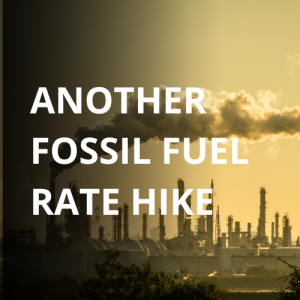 Ameren Illinois is pushing to raise its profit rate for shareholders to a higher level than any other Illinois utility seeking a rate increase, the Citizens Utility Board (CUB) revealed Monday, as it urged regulators to slash the proposal by at least $59.2 million.
Ameren Illinois is pushing to raise its profit rate for shareholders to a higher level than any other Illinois utility seeking a rate increase, the Citizens Utility Board (CUB) revealed Monday, as it urged regulators to slash the proposal by at least $59.2 million.
“Ameren’s push to increase gas bills and inflate its profit rate is unjust and unreasonable, and we call on state regulators to slash this unnecessary rate hike,” CUB Executive Director David Kolata said. “As climate change gets worse and customers struggle to afford their bills, we can’t keep bailing out an expensive, outdated fossil fuel like gas.”
Kolata urged Ameren customers to visit CUBHelpCenter.com to sign a petition to the Illinois Commerce Commission (ICC) against the proposed increase.
On January 6, Ameren Illinois filed for a $160.4 million rate hike with the ICC, pushing to increase delivery rates by an average of $6.68 a month (for customers who use about 62 therms of gas a month).
Ameren Illinois also received a $76 million gas hike in January of 2021. In the two years since that rate hike, the gas utility’s parent company, Ameren, has raked in more than $2 billion in profits.
Consumer advocates have sounded the alarm in 2023, as major Illinois gas and electric utilities are pushing for a record six rate hikes totaling $2.8 billion. In response to this unprecedented attack, several groups and agencies are challenging increases, including the Illinois Attorney General’s Office, Environmental Defense Fund, Illinois PIRG and CUB.
In the Ameren gas case, CUB, the Illinois Industrial Energy Consumers (IIEC) group, Federal Executive Agencies, Prairie Rivers Network and United Congregations of Metro East partnered to commission expert analysis from Brubaker & Associates, Inc., a Missouri-based consulting firm that specializes in utility regulation. Through the testimony, filed May 5, CUB makes several recommendations to slash the rate hike by more than $59 million, including:
Return on Equity. Ameren has proposed an excessive increase in its “return on equity” (ROE)—or profit rate for shareholders—from about 9.67 percent to 10.7 percent. That would be the highest ROE of any utility asking for a rate hike in Illinois. Instead, CUB argues for a more reasonable 9.5 percent ROE, which would reduce the rate hike by $25.6 million.
In the rate-setting process, ROE is the most important component of a utility’s “rate of return,” which is the rate at which the utility recovers the cost of financing physical assets, such as gas meters, pipes and gas-storage fields.
Capital Structure. CUB’s expert testimony also found problems with another key component of rate of return: “capital structure”—basically how it finances infrastructure projects. Ameren’s proposed “common equity ratio”—how much of the utility’s financing comes from issuing stocks—was too high, CUB argued. The more reasonable equity ratio CUB recommends would reduce the rate hike by another $6.3 million.
Other financial adjustments, including those related to sales forecasts, labor expenses and cash working capital issues, amounted to more than $27 million, for a total recommended reduction of at least $59.2 million. CUB hopes to support additional reductions uncovered by the Illinois Attorney General’s Office and other parties.
About $76.7 million of the total $160.4 million rate hike is for rider surcharges customers have already been paying, including through the controversial Qualified Infrastructure Plant (QIP) surcharge, which state legislators allowed gas utilities to slap on customers beginning in 2013. This regulatory shortcut allows utilities to rapidly increase bills outside a standard ICC rate case proceeding–which is why CUB has pushed to sunset this charge. Under Ameren’s rate-hike proposal, the $76.7 million in surcharges would be rolled into delivery rates going forward.
Minus the amount from QIP and other surcharges, the rate hike is about $83.8 million, and CUB’s recommendations would cut that amount by about 70 percent.
The ICC will rule on the rate-hike request around November, after an 11-month rate case. The proposed increase would impact delivery rates–what the utility charges to cover the costs of delivering gas to customer homes, plus a profit. Those rates take up about a third to a half of gas bills.
Ameren Illinois serves about 816,000 gas customers in Central and Southern Illinois.

